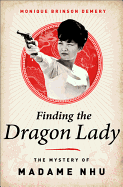
Fifty years ago, Madame Ngo Dinh Nhu, National Assembly representative and sister-in-law of South Viet Nam's celibate President Ngo Dinh Diem, was a controversial figure who both fascinated and repelled the American press. Named Tran Le Xuan, or "Beautiful Spring" by her parents, she became known in the West as "the Dragon Lady," an alluring but treacherous femme fatale whose infamous "monk barbecue" statement following a Buddhist bonze's self-immolation triggered the U.S.'s deeper involvement in the Vietnam War and its eventual loss in April 1975.
After the U.S.-backed 1963 coup that killed Diem and her husband, Madame Nhu spent many years in obscurity, until 2005 when Monique Demery, a young scholar with an interest in Vietnam, decided to track her down. Demery's persistence helped her to locate the elusive Madame Nhu, who created elaborate cat-and-mouse schemes for their purported meetings but stood Demery up each time. They nevertheless formed a six-year friendship during which Demery succeeded in calling forth, via phone and e-mail conversations, poignant remembrances from Nhu, until the latter's death in April 2011. In Finding the Dragon Lady: The Mystery of Madame Nhu, Demery paints Nhu as thoughtful, passionate and perennially embattled: a plucky teen who chose the role of the evil stepmother "for its magnificent potential" in a school's ballet performance of Snow White; a young mother fiercely protective of her infant daughter during a Communist forced march; a reformer critical of gender inequality yet whose strident ways alienated her from the very women whom she wished to save. --Thuy Dinh, editor, Da Mau magazine

